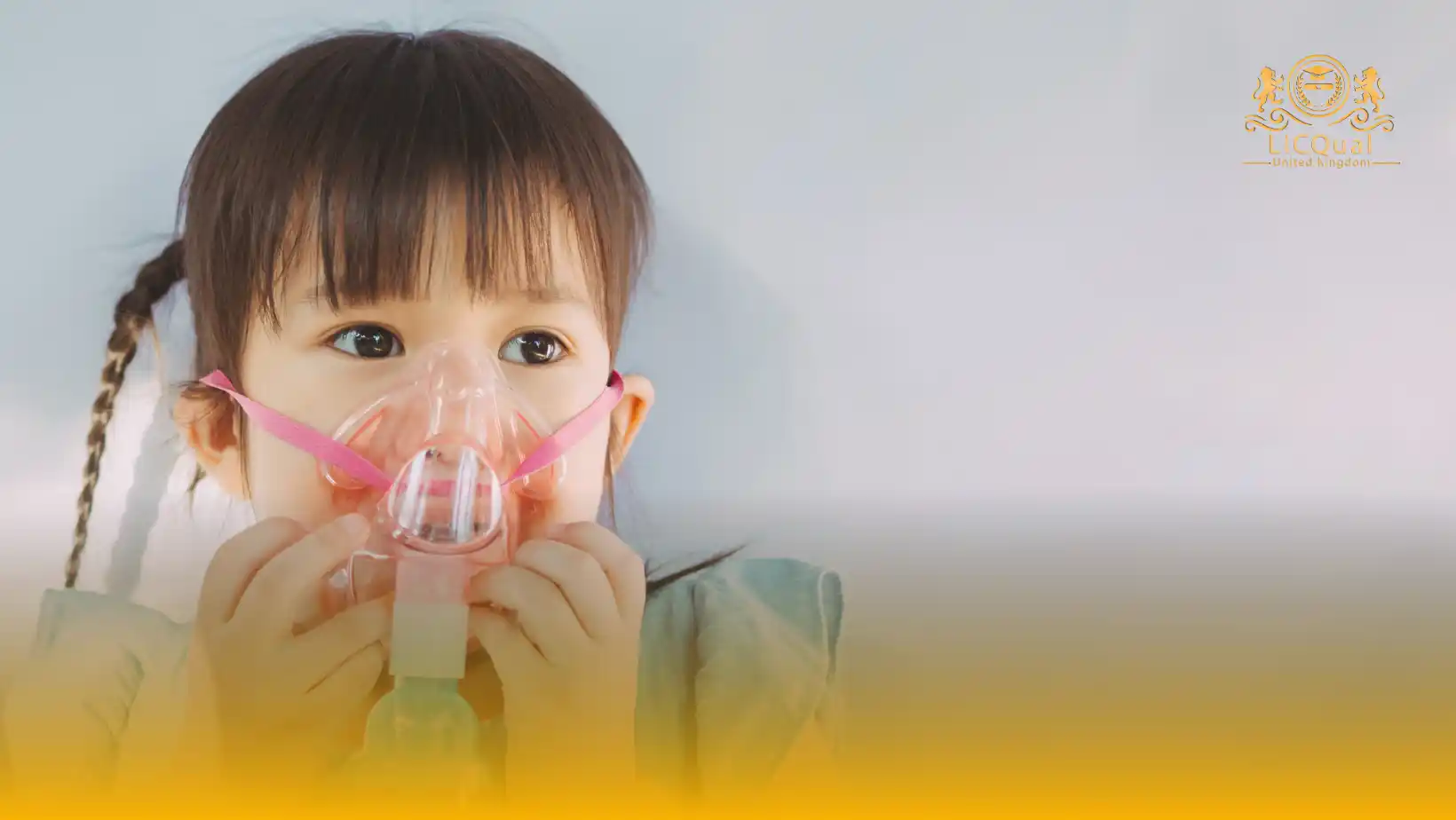The LICQual Level 7 Postgraduate Diploma in Respiratory Medicine (PgDRM) is a specialised qualification designed for healthcare professionals seeking to deepen their expertise in respiratory care. This qualification is ideal for those already working in the healthcare sector, including respiratory specialists, nurses, and clinicians, who wish to enhance their career prospects and further their Continuing Professional Development (CPD).
Through comprehensive units, this diploma offers learners the opportunity to gain advanced knowledge in areas such as respiratory pathophysiology, clinical management of respiratory disorders, and the latest therapeutic interventions. The curriculum is designed to ensure that learners not only gain theoretical knowledge but also develop the practical skills needed to implement this knowledge in real-world clinical settings.
Centres offering the LICQual Level 7 Postgraduate Diploma in Respiratory Medicine must meet stringent requirements, including employing competent and qualified staff with expertise in the field of respiratory medicine. Furthermore, centres must be equipped with the appropriate materials and resources to deliver high-quality training, ensuring learners receive a robust educational experience. This commitment to quality guarantees that learners are well-prepared for the demands of their roles and equipped to make a positive impact on patient care.
The PgDRM qualification is an excellent choice for healthcare professionals seeking to stay at the forefront of respiratory medicine, ensuring they are well-equipped to tackle the complexities of respiratory healthcare in an ever-evolving field.
Course Overview
Qualification Title
LICQual Level 7 Postgraduate Diploma in Respiratory Medicine (PgDRM)
Total Units
6
Total Credits
120
GLH
600
Qualification #
LICQ2200985
Qualification Specification
To enroll in the LICQual Level 7 Postgraduate Diploma in Respiratory Medicine (PgDRM), applicants must meet the following criteria:
|
Qualification# |
Unit Title |
Credits |
GLH |
|---|---|---|---|
|
LICQ2200985-1 |
Advanced Respiratory Pathophysiology |
20 |
100 |
|
LICQ2200985-2 |
Clinical Assessment in Respiratory Medicine |
20 |
100 |
|
LICQ2200985-3 |
Respiratory Pharmacology and Therapeutics |
20 |
100 |
|
LICQ2200985-4 |
Respiratory Disorders in Special Populations |
20 |
100 |
|
LICQ2200985-5 |
Advanced Respiratory Interventions and Management |
20 |
100 |
|
LICQ2200985-6 |
Research and Evidence-Based Practice in Respiratory Medicine |
20 |
100 |
By the end of this course, learners will be able to:
Unit 1: Advanced Respiratory Pathophysiology
By the end of this unit, learners will be able to:
- Critically analyse the pathophysiological mechanisms underlying common respiratory diseases.
- Evaluate the impact of genetics, environmental factors, and lifestyle on respiratory health.
- Explain the cellular and molecular processes involved in the development of chronic respiratory diseases, such as COPD, asthma, and pulmonary fibrosis.
- Assess the role of inflammation and immune responses in respiratory diseases.
Unit 2: Clinical Assessment in Respiratory Medicine
By the end of this unit, learners will be able to:
- Demonstrate advanced clinical assessment techniques, including history taking and physical examination.
- Interpret pulmonary function tests (PFTs), arterial blood gases (ABGs), and chest imaging to diagnose respiratory disorders.
- Evaluate the significance of biomarkers and clinical indicators in managing respiratory diseases.
- Integrate patient data to make informed clinical decisions in complex respiratory cases.
Unit 3: Respiratory Pharmacology and Therapeutics
By the end of this unit, learners will be able to:
- Evaluate the pharmacokinetics and pharmacodynamics of common respiratory medications.
- Apply evidence-based pharmacological therapies to effectively manage respiratory conditions.
- Assess the potential side effects and drug interactions associated with respiratory pharmacology.
- Recommend and monitor appropriate therapeutic interventions for patients with chronic respiratory diseases.
Unit 4: Respiratory Disorders in Special Populations
By the end of this unit, learners will be able to:
- Analyse the challenges in diagnosing and managing respiratory conditions in special populations, including the elderly, children, and those with comorbidities.
- Develop individualised care plans to manage respiratory diseases in high-risk patient groups.
- Assess the impact of age and comorbidity on the progression and management of respiratory diseases.
- Evaluate treatment strategies tailored to the needs of vulnerable populations.
Unit 5: Advanced Respiratory Interventions and Management
By the end of this unit, learners will be able to:
- Demonstrate expertise in advanced respiratory interventions, such as mechanical ventilation, non-invasive positive pressure ventilation, and oxygen therapy.
- Apply evidence-based approaches to managing acute respiratory failure and chronic respiratory conditions.
- Design and implement palliative care strategies for patients with end-stage respiratory diseases.
- Assess the effectiveness and risks of advanced interventions in complex respiratory disorders.
Unit 6: Research and Evidence-Based Practice in Respiratory Medicine
By the end of this unit, learners will be able to:
- Critically appraise current research in respiratory medicine, evaluating its methodology and findings.
- Integrate evidence-based practices into clinical decision-making and patient care.
- Conduct small-scale research or audits to assess the effectiveness of respiratory interventions in clinical practice.
- Contribute to the development of best practices in respiratory medicine through research and evidence-based guidelines.
The LICQual Level 7 Postgraduate Diploma in Respiratory Medicine (PgDRM) is designed for healthcare professionals who want to specialize in lung and respiratory care. This course is ideal for doctors, pulmonologists, nurses, allied health professionals, and researchers seeking advanced knowledge, practical expertise, and global recognition. It provides a comprehensive understanding of respiratory diseases, critical care management, and patient-centered approaches for career growth and leadership in respiratory medicine.
Medical Doctors and Physician
- Enhance diagnostic skills in respiratory and pulmonary disorders
- Gain expertise in managing chronic conditions like COPD and asthma
- Develop advanced clinical decision-making skills
- Learn modern therapeutic approaches and interventions
- Earn a UK-recognized Level 7 postgraduate qualification
- Prepare for leadership roles in hospitals and respiratory clinics
Pulmonologists and Specialist Physicians
- Deepen knowledge of lung diseases and critical care management
- Master evidence-based treatment strategies for respiratory conditions
- Acquire hands-on skills in diagnostic techniques and patient monitoring
- Improve patient outcomes through specialized care
- Strengthen professional credibility in international healthcare
- Participate in advanced clinical research and audits
Nurses and Advanced Practice Clinicians
- Expand understanding of respiratory assessment and monitoring
- Learn advanced techniques for symptom and oxygen therapy management
- Enhance patient communication and education skills
- Develop competencies in multidisciplinary care teams
- Apply evidence-based strategies in clinical practice
- Access flexible study options for working professionals
Allied Health Professionals and Respiratory Therapists
- Understand pulmonary rehabilitation and patient care techniques
- Gain skills in managing ventilators and oxygen therapy
- Develop expertise in patient-centered respiratory interventions
- Strengthen collaboration with physicians and multidisciplinary teams
- Learn latest practices in chronic and acute respiratory care
- Prepare for advanced clinical roles in respiratory departments
Biomedical Scientists and Researchers
- Study respiratory pathophysiology and disease mechanisms
- Conduct applied research in pulmonology and respiratory care
- Collaborate with clinicians on clinical trials and studies
- Present findings in professional and academic forums
- Contribute to innovations in diagnostics and treatment
- Expand career opportunities in research and academia
Healthcare Administrators and Managers
- Understand operational management of respiratory departments
- Develop policies for patient safety and quality assurance
- Learn resource allocation and workflow optimization
- Strengthen leadership and decision-making skills
- Support evidence-based clinical governance
- Enhance hospital and respiratory program efficiency
International Medical Graduates and Specialists
- Obtain a UK-recognized diploma for global career mobility
- Adapt knowledge to international healthcare standards
- Strengthen credentials for licensure or specialist recognition abroad
- Access flexible online and blended learning options
- Join a global network of respiratory medicine professionals
- Expand opportunities in clinical practice, research, and teaching
To offer the LICQual Level 7 Postgraduate Diploma in Respiratory Medicine (PgDRM), centres must meet specific requirements to ensure high-quality training and learner success. The following are the key criteria for accredited centres:
- Qualified and Competent Staff: Centres must employ qualified trainers with substantial experience and expertise in respiratory medicine, including advanced clinical practice, diagnostics, and therapeutic interventions. Trainers should hold relevant qualifications in respiratory care or related fields and have a proven track record in teaching and clinical practice.
- Specialised Facilities: Centres must have access to state-of-the-art clinical facilities and resources, including respiratory care units, diagnostic equipment (e.g., pulmonary function testing), imaging tools, and oxygen therapy equipment. These resources must be suitable for advanced respiratory care training and allow learners to apply theoretical knowledge in a real-world setting.
- Learning Materials and Resources: Centres should provide comprehensive learning materials, including textbooks, journals, online resources, and access to the latest research in respiratory medicine. This ensures learners can stay updated on the latest developments in the field.
- Clinical Placement Opportunities: Centres must offer learners opportunities to gain practical experience in healthcare settings, including hospitals, clinics, or specialised respiratory care units. Clinical placements are crucial for developing practical skills in managing complex respiratory disorders and interventions.
- Administrative Support: Centres should have a well-organised administrative structure to ensure smooth delivery of the course. This includes managing enrolments, providing academic guidance, tracking learner progress, and offering support for assessments and examinations.
- Compliance with Quality Assurance Standards: Centres must adhere to national and international quality assurance standards in education and training. This includes maintaining accurate records, conducting regular assessments, and ensuring all teaching practices align with professional standards in respiratory medicine.
- Commitment to CPD: Centres should have a clear strategy for supporting learners’ Continuing Professional Development (CPD). This could include providing additional training opportunities, workshops, and access to conferences in the field of respiratory medicine.
- Health and Safety Protocols: Centres must maintain appropriate health and safety protocols, particularly when dealing with respiratory care equipment and patient interactions. They must ensure all facilities comply with health regulations and provide a safe learning environment for learners and patients.
By meeting these requirements, centres can offer a comprehensive, high-quality learning experience for learners pursuing the LICQual Level 7 Postgraduate Diploma in Respiratory Medicine, helping them gain the knowledge, skills, and expertise needed to excel in the field of respiratory medicine.
Assessment and Verification
All units within this qualification are subject to internal assessment by the approved centre and external verification by LICQual. The qualification follows a criterion-referenced assessment approach, ensuring that learners meet all specified learning outcomes.
To achieve a ‘Pass’ in any unit, learners must provide valid, sufficient, and authentic evidence demonstrating their attainment of all learning outcomes and compliance with the prescribed assessment criteria. The Assessor is responsible for evaluating the evidence and determining whether the learner has successfully met the required standards.
Assessors must maintain a clear and comprehensive audit trail, documenting the basis for their assessment decisions to ensure transparency, consistency, and compliance with quality assurance requirements.







